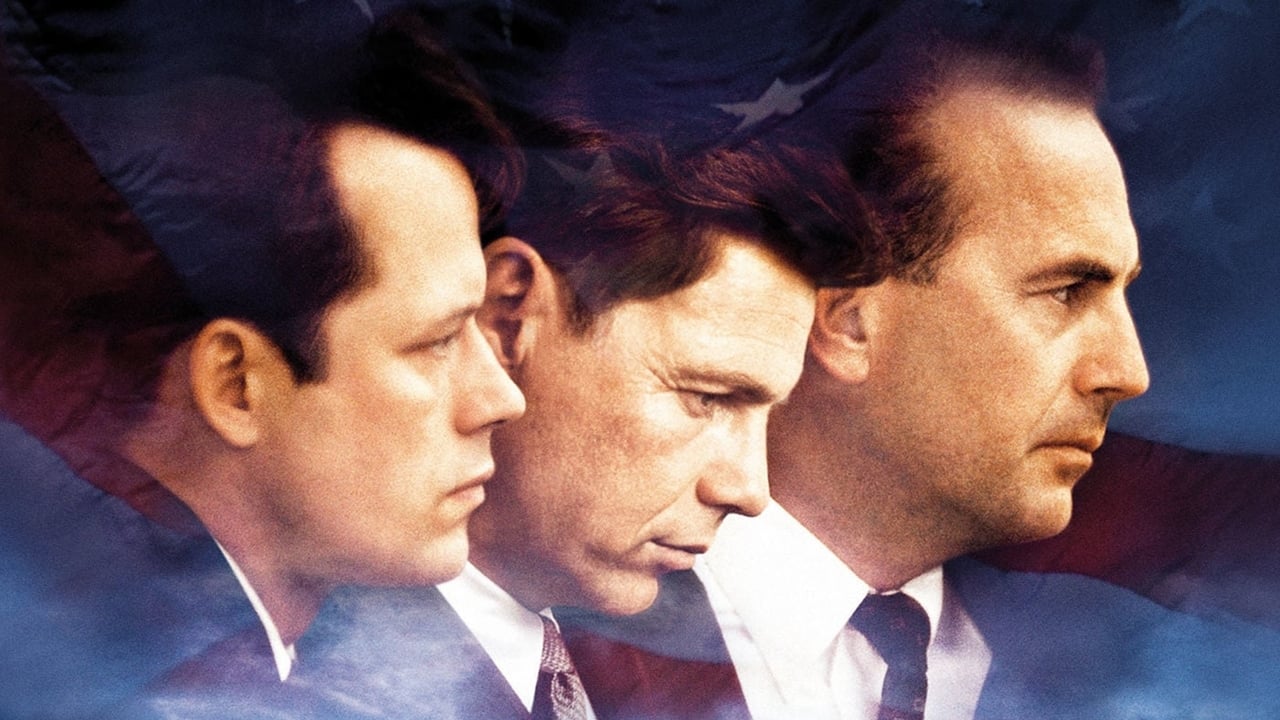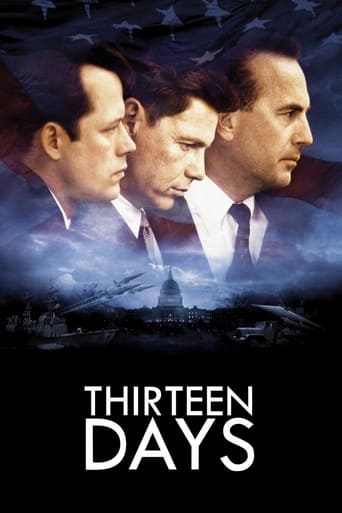



Purely Joyful Movie!
Exactly the movie you think it is, but not the movie you want it to be.
View MoreWhile it doesn't offer any answers, it both thrills and makes you think.
View MoreThere's no way I can possibly love it entirely but I just think its ridiculously bad, but enjoyable at the same time.
View MoreThis is an interesting film. Thirteen Days is, at times, independent and rebellious of common Hollywood tropes. Other times, it panders to the general public. The film was good, but conceptually contradictory. The obvious issue of the infamous 'Kevin Costner accent' did not bother me so much and there are powerful performances among the supporting cast, certainly Steven Culp. Bruce Greenwood delivered a noticeably dedicated performance, albeit uniquely deviant. They used several gimmicks, such as slow-motion, black-and-white, and filtered shots. All of these are fine, assuming they are utilized tactfully. But all three in the same film? Simultaneously? It's a hat on a hat on a hat and was distracting from the better aspects of Thirteen Days. Overall, when a film makes choices indicative of wanting to separate itself from the norm, but then also contrived and uninspired choices, it leaves an impression of fear, an unwillingness to fully commit. The arbitrarily selective liberties this film took could have left it dangerously close to pot-boiler status. Thirteen Days falls just short of greatness because it just couldn't get out of its own way. 7.5/10 — watching Thirteen Days (movie).
View MoreI was only a toddler during the crisis, but over the years I have read over 30 books about the JFK assassination and some of those talk about the Cuban Missile Crisis at length.The US was within hours of a nuclear war with the USSR and Kennedy's intelligence and calmness saved the day. The war hawks in the administration along with those with the same sentiment on Khrushchev's side kept ratcheting up their desire to go to war.After JFK was murdered, Khruschev mentioned that the chance of the Cold War ending died with JFK.I have loved this movie since its first release and enjoy watching it still today. A good history lesson for people that want to know more about Kennedy's presidency.As far as Costner's accent, to me it didn't hinder the movie at all. The story is the thing and the acting overall was top notch.
View MoreA good movie, with some excellent performances. Bruce Greenwood is utterly believable as President Kennedy and was a bit of inspired casting, and Steven Culp makes an excellent Bobby Kennedy. The latter's performance deserves special mention, I feel, as Culp is otherwise a relative unknown, someone who has a long list of walk on parts in numerous TV series from The Cosby Show to Grey's Anatomy, yet is not exactly a familiar name or face.As a drama it is enjoyable to follow and achieves real dramatic tension during critical moments, which is a tricky act to pull off in any story when one already knows the end (if not, Google 'Cuban Missile Crisis'!)I was not left with an impression of having watched a high end movie, it left more of an impression of a high quality TV drama-documentary. In short I liked it! It kept my attention all the way through, and I'm someone who easily loses interest if I feel the quality of a movie is becoming suspect, or it is simply boringly told.Kevin Costner ... his performance is good, I suppose, but ... what is it about the man? Towards the end of the movie I get the feeling he's trying to steal the show. He simply a presidential adviser, but as the political tensions escalate I feel Cosner is forgetting that the movie is not about him, but about Kennedy, nucleur missiles and a key moment in world diplomatic history. He should stayed in the background and trusted the abilities of Greenwood, etc. to carry the drama to its conclusion.Or maybe this criticism should really be directed at the writers or director. However, maybe I'm overdoing the criticism. Costner's a big name. If he'd been an unknown in his first movie I'd be praising he to the heavens.All-in-all a movie I'd recommend to a friend as a memorable drama which will leave a good impression and even educate one a little bit.
View MoreThe 1962 Cuban Missile Crisis seen through the eyes of President assistant Kenny O'Donnell (Kevin Costner who hands perfectly the role )as trusted confidante and with significance importance of Robert Kennedy ( Steven Culp who bears remarkable resemblance )and of course President John F . Kennedy ( a solid Bruce Greenwood ) . This interesting film widely develops the Cuban Missile Crisis that was a confrontation between the Soviet Union, Cuba and the United States in October 1962, during the Cold War. The picture is packed with suspense , drama , historical deeds and is quite entertaining . It's correctly based on facts and the few sacrifices of accuracy are realized in the sense of of dramatic license . The motion picture is very well directed by Roger Donaldson who formerly worked with Costner in another suspenseful movie and also plenty of political intrigue titled ¨No way out (87) ¨ .Adding more details over the widely depicted on the movie the events happened of the following manner : In September 1962, the Cuban and Soviet governments began to surreptitiously build bases in Cuba for a number of medium- and intermediate-range ballistic nuclear missiles (MRBMs and IRBMs) with the ability to strike most of the continental United States. This action was subsequent to the 1958 deployment of Thor IRBMs in the UK and Jupiter IRBMs to Italy and Turkey in 1961; more than 100 U.S.-built missiles having the capability to strike Moscow with nuclear warheads. On October 14, 1962, a United States U-2 photo-reconnaissance plane captured photographic proof of Soviet missile bases under construction in Cuba.The ensuing crisis ranks with the Berlin Blockade as one of the major confrontations of the Cold War and is generally regarded as the moment in which the Cold War came closest to turning into a nuclear conflict .The US President ( Bruce Greenwood) , Attorney General Robert Kennedy (Steven Culp ),State Secretary Robert McNamara ( Dylan Baker ) and his military staff ( Bill Smitrovich , Ed Lauter , James Karen , Len Cariou) and general Curtis LeMay (Kevin Conway ) considered attacking Cuba via air and sea and settled on a "quarantine" of Cuba. The U.S. announced that it would not permit offensive weapons to be delivered to Cuba and demanded that the Soviets dismantle the missile bases already under construction or completed in Cuba and remove all offensive weapons. The Kennedy administration held a slim hope that the Kremlin would agree to their demands, and expected a military confrontation. On the Soviet end, Nikita Khrushchev wrote Kennedy that his quarantine of "navigation in international waters and air space to constitute an act of aggression propelling humankind into the abyss of a world nuclear-missile war." Fidel Castro encouraged Khrushchev to launch a preemptive first-strike nuclear attack on the U.S. The Soviets publicly balked at the U.S. demands, but in secret back-channel communications initiated a proposal to resolve the crisis. The confrontation ended on October 28, 1962 when President John F. Kennedy and United Nations Secretary-General U Thant reached an agreement with Soviet Premier Nikita Khrushchev to dismantle the offensive weapons and return them to the Soviet Union, subject to United Nations verification, in exchange for an agreement by the United States to never invade Cuba. The Soviets removed the missile systems and their support equipment, loading them onto eight Soviet ships from November 5–9. A month later, on December 5 and 6, the Soviet IL-28 bombers were loaded onto three Soviet ships and shipped back to Russia. The quarantine was formally ended previously on November 20, 1962. As a secret part of the agreement, all US-built Thor and Jupiter IRBMs deployed in Europe were deactivated by September 1963.The Cuban Missile Crisis spurred the creation of the Hotline Agreement and the Moscow-Washington hot line, a direct communications link between Moscow and Washington .
View More